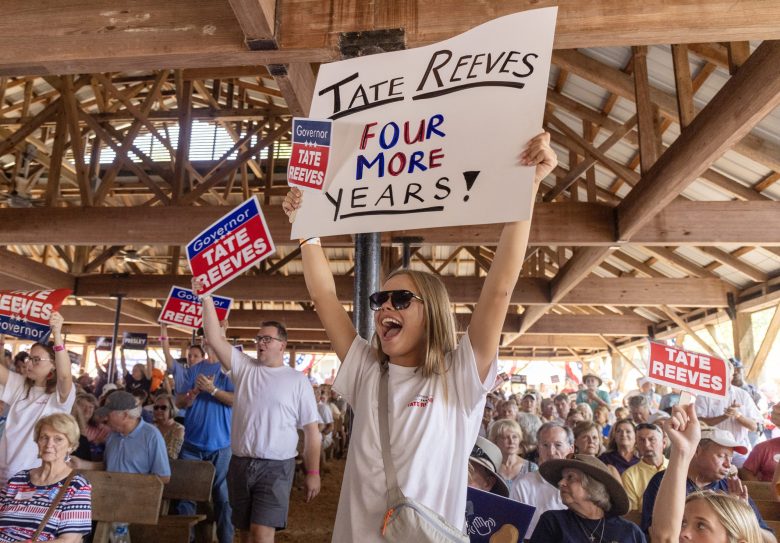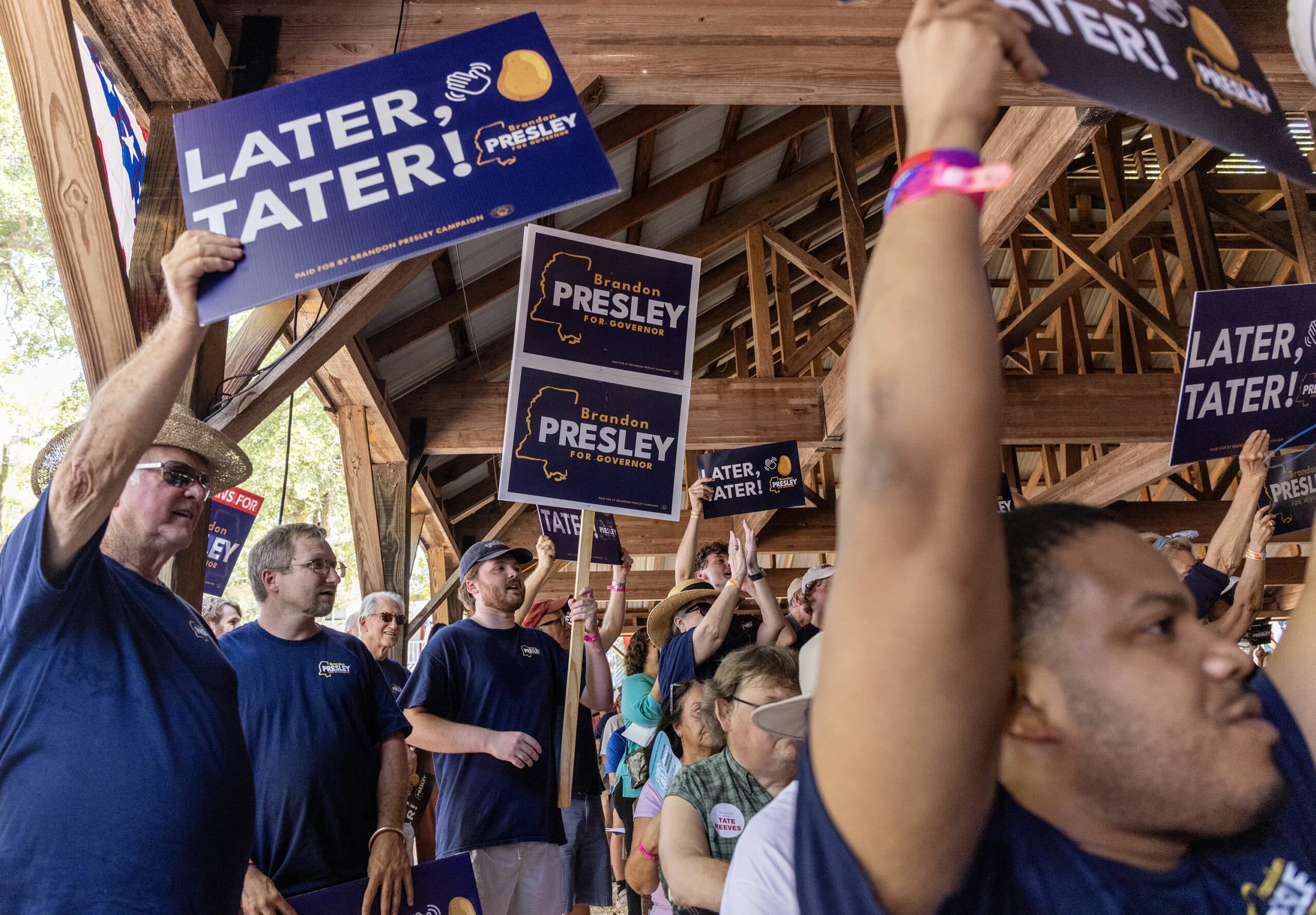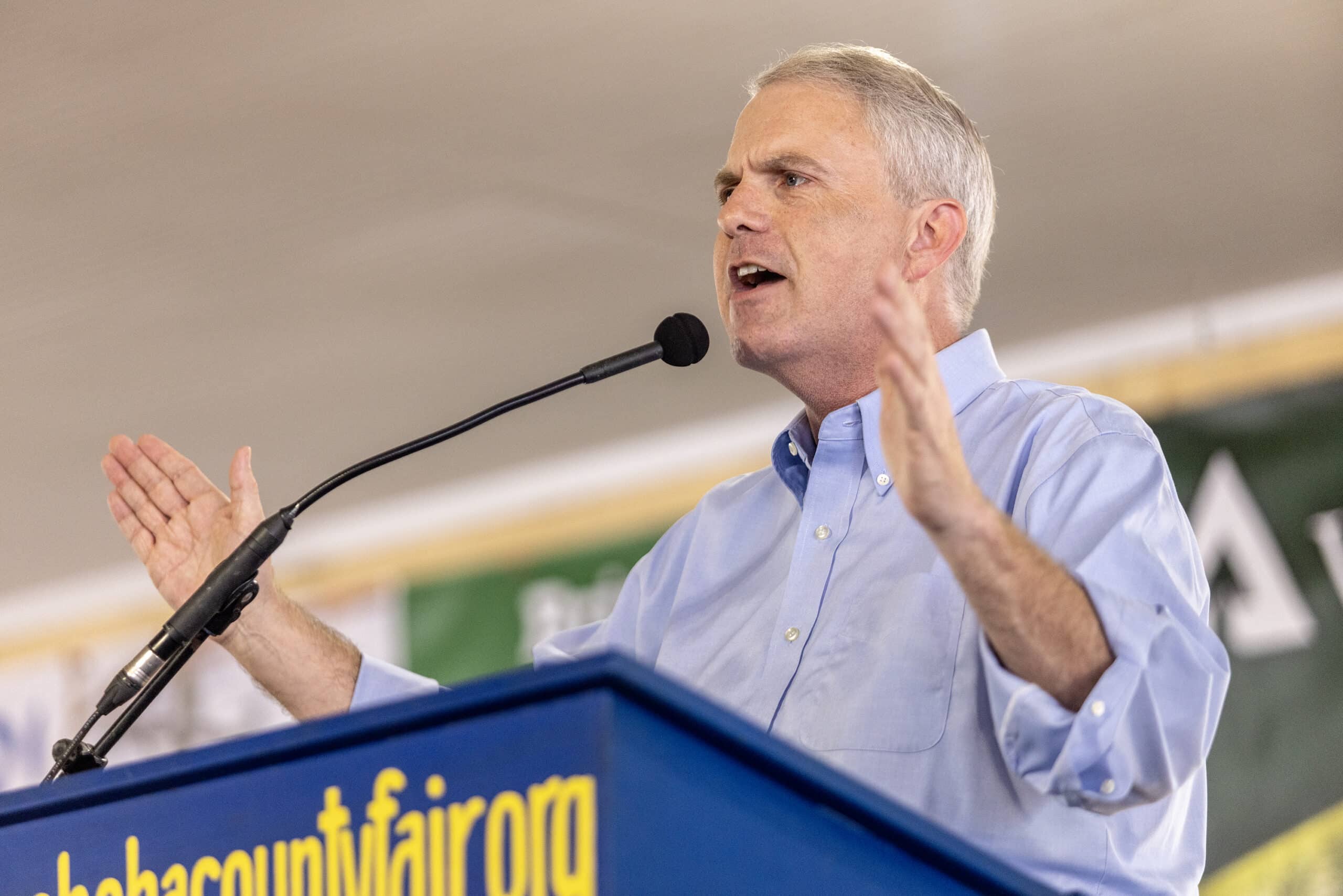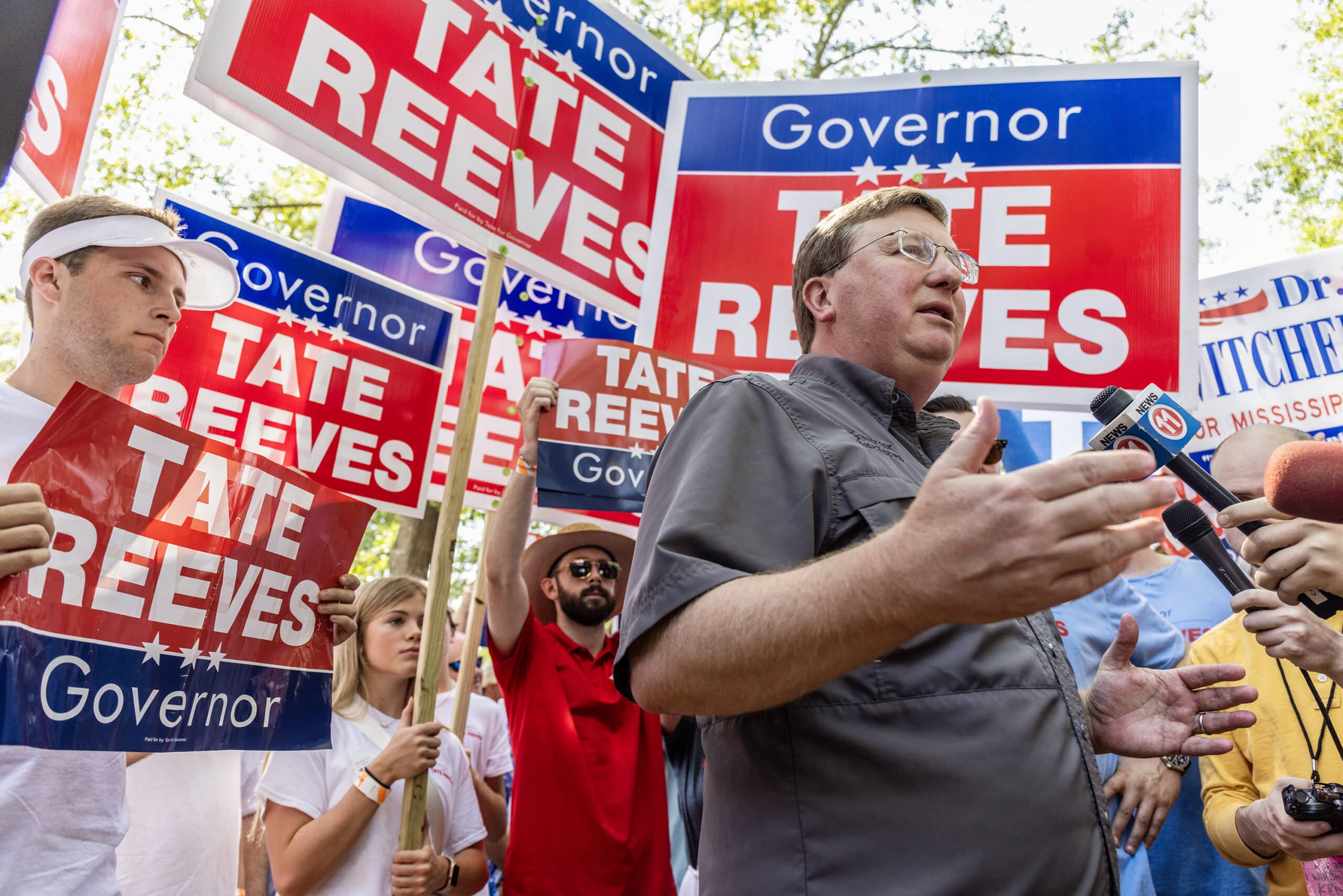Mississippi Today
Rowdy Neshoba County Fair attendees show that bitter race for governor is officially in full swing


NESHOBA COUNTY FAIR — The sheer intensity of crowd interaction at the Neshoba County Fair on Thursday largely overshadowed the traditional stump speeches from the two leading candidates for governor, signaling the arrival of an intense election cycle that will grip the state for the next four months.
Hundreds of supporters of incumbent Republican Gov. Tate Reeves and Democratic candidate Brandon Presley filled the Founder’s Square benches and fiercely interacted with the two candidates in a way that hasn’t been seen at the event in recent years.
Reeves’ supporters repeated loud “Tate!” chants during the governor’s speech, while Presley’s supporters shouted “Let’s go, Brandon!” when the Democrat delivered his 10-minute stump. And, at certain points, the two factions engaged in chant battles.
When Presley asked the crowd who they trusted to stand up for working Mississippians, Reeves’ faction shouted “Tate” to dump cold water on the Democrat’s speech.
And when Reeves concluded his speech, Presley supporters shouted, “Lock him up,” an apparent extension of their attempt to tie the governor to the welfare scandal, though prosecutors have not charged the governor with any crime connected to the issue.

The first-term governor, at one point during his speech, even used his allotted time to engage in a back-and-forth with a Presley supporter who was standing near the stage.
“To support him, you’ve got to believe we are on the wrong track,” Reeves said to the supporter. “You’ve got to believe that our culture is wrong and that our values are bad. You want to say yes to that, sir, because you believe it? You believe it, don’t you?”
While neither candidate delivered any new policy pitches, their messaging and starkly differing views of Mississippi’s present and future became crystal clear under the blistering July heat at one of the state’s longest-running political traditions.
Reeves staunchly defended his record as a conservative leader and attacked Democratic Party values while Presley attempted to cast the governor as a derelict politician who is numb to the difficulties average Mississippians deal with.
Reeves, running for a second term, rattled off accomplishments over the last four years, including recruiting new jobs to the state and improving education test scores.
“To hear Brandon’s fiction, Mississippi is just not doing well,” Reeves said. “It’s all my fault. … He said, and I quote, ‘Under Tate Reeves’ leadership, we are moving in the wrong direction.’ That’s what Brandon Presley says. The math says that’s pure fiction.”

Presley, the current utility regulator for north Mississippi, panned the governor for not doing enough to keep health care infrastructure in the state from deteriorating and again reiterated to reporters his support for expanding Medicaid coverage to the working poor.
“Much like Nero of old, he’s fiddling while our hospitals are burning to the ground, and he doesn’t care,” Presley said of Reeves.
Reeves called Presley’s Medicaid expansion push a “welfare check” to poor Mississippians and later told reporters he believed the better approach was for more Mississippians to obtain private insurance coverage that tied to their careers.
The governor also tied Presley, a moderate Democrat, with other liberal candidates across the nation, such as California Gov. Gavin Newsom and former Georgia gubernatorial candidate Stacey Abrams, common rhetoric Reeves has used during the campaign.

Presley rejected that notion and said the governor was using that tactic as a smokescreen to keep from discussing real campaign issues.
Typical publicity stunts also made their way to the fairgrounds, with two Presley supporters donning orange jumpsuit costumes mimicking prison inmates to symbolize two of the governor’s donors who have pleaded guilty to crimes connected to the state’s welfare scandal.
The Wednesday speeches marked a rare instance in which all three GOP candidates for governor appeared in the same location.
Reeves is expected to capture the Republican nomination in the Aug. 8 primary election, though his two GOP opponents, David Hardigree and John Witcher, also delivered stump speeches on Wednesday.
Hardigree, a retired military member, advocated for new efforts to crack down on crime throughout the state, and Witcher, a doctor, said he would work to enact conservative social policies such as putting Bibles in public school classrooms.
The winner of the primary will compete against Presley, the only Democratic candidate, in the general election on Nov. 6.
This article first appeared on Mississippi Today and is republished here under a Creative Commons license.
Mississippi Today
On this day in 1977, Alex Haley awarded Pulitzer for ‘Roots’

April 19, 1977

Alex Haley was awarded a special Pulitzer Prize for “Roots,” which was also adapted for television.
Network executives worried that the depiction of the brutality of the slave experience might scare away viewers. Instead, 130 million Americans watched the epic miniseries, which meant that 85% of U.S. households watched the program.
The miniseries received 36 Emmy nominations and won nine. In 2016, the History Channel, Lifetime and A&E remade the miniseries, which won critical acclaim and received eight Emmy nominations.
This article first appeared on Mississippi Today and is republished here under a Creative Commons Attribution-NoDerivatives 4.0 International License.![]()
Mississippi Today
Speaker White wants Christmas tree projects bill included in special legislative session

House Speaker Jason White sent a terse letter to Lt. Gov. Delbert Hosemann on Thursday, saying House leaders are frustrated with Senate leaders refusing to discuss a “Christmas tree” bill spending millions on special projects across the state.
The letter signals the two Republican leaders remain far apart on setting an overall $7 billion state budget. Bickering between the GOP leaders led to a stalemate and lawmakers ending their regular 2025 session without setting a budget. Gov. Tate Reeves plans to call them back into special session before the new budget year starts July 1 to avoid a shutdown, but wants them to have a budget mostly worked out before he does so.
White’s letter to Hosemann, which contains words in all capital letters that are underlined and italicized, said that the House wants to spend cash reserves on projects for state agencies, local communities, universities, colleges, and the Mississippi Department of Transportation.
“We believe the Senate position to NOT fund any local infrastructure projects is unreasonable,” White wrote.
The speaker in his letter noted that he and Hosemann had a meeting with the governor on Tuesday. Reeves, according to the letter, advised the two legislative leaders that if they couldn’t reach an agreement on how to disburse the surplus money, referred to as capital expense money, they should not spend any of it on infrastructure.
A spokesperson for Hosemann said the lieutenant governor has not yet reviewed the letter, and he was out of the office on Thursday working with a state agency.
“He is attending Good Friday services today, and will address any correspondence after the celebration of Easter,” the spokesperson said.
Hosemann has recently said the Legislature should set an austere budget in light of federal spending cuts coming from the Trump administration, and because state lawmakers this year passed a measure to eliminate the state income tax, the source of nearly a third of the state’s operating revenue.
Lawmakers spend capital expense money for multiple purposes, but the bulk of it — typically $200 million to $400 million a year — goes toward local projects, known as the Christmas Tree bill. Lawmakers jockey for a share of the spending for their home districts, in a process that has been called a political spoils system — areas with the most powerful lawmakers often get the largest share, not areas with the most needs. Legislative leaders often use the projects bill as either a carrot or stick to garner votes from rank and file legislators on other issues.
A Mississippi Today investigation last year revealed House Ways and Means Chairman Trey Lamar, a Republican from Sentobia, has steered tens of millions of dollars in Christmas tree spending to his district, including money to rebuild a road that runs by his north Mississippi home, renovate a nearby private country club golf course and to rebuild a tiny cul-de-sac that runs by a home he has in Jackson.
There is little oversight on how these funds are spent, and there is no requirement that lawmakers disburse the money in an equal manner or based on communities’ needs.
In the past, lawmakers borrowed money for Christmas tree bills. But state coffers have been full in recent years largely from federal pandemic aid spending, so the state has been spending its excess cash. White in his letter said the state has “ample funds” for a special projects bill.
“We, in the House, would like to sit down and have an agreement with our Senate counterparts on state agency Capital Expenditure spending AND local projects spending,” White wrote. “It is extremely important to our agencies and local governments. The ball is in your court, and the House awaits your response.”
This article first appeared on Mississippi Today and is republished here under a Creative Commons Attribution-NoDerivatives 4.0 International License.
Mississippi Today
Advocate: Election is the chance for Jackson to finally launch in the spirit of Blue Origin

Editor’s note: This essay is part of Mississippi Today Ideas, a platform for thoughtful Mississippians to share fact-based ideas about our state’s past, present and future. You can read more about the section here.
As the world recently watched the successful return of Blue Origin’s historic all-women crew from space, Jackson stands grounded. The city is still grappling with problems that no rocket can solve.
But the spirit of that mission — unity, courage and collective effort — can be applied right here in our capital city. Instead of launching away, it is time to launch together toward a more just, functioning and thriving Jackson.
The upcoming mayoral runoff election on April 22 provides such an opportunity, not just for a new administration, but for a new mindset. This isn’t about endorsements. It’s about engagement.
It’s a moment for the people of Jackson and Hinds County to take a long, honest look at ourselves and ask if we have shown up for our city and worked with elected officials, instead of remaining at odds with them.
It is time to vote again — this time with deeper understanding and shared responsibility. Jackson is in crisis — and crisis won’t wait.
According to the U.S. Census projections, Jackson is the fastest-shrinking city in the United States, losing nearly 4,000 residents in a single year. That kind of loss isn’t just about numbers. It’s about hope, resources, and people’s decision to give up rather than dig in.
Add to that the long-standing issues: a crippled water system, public safety concerns, economic decline and a sense of division that often pits neighbor against neighbor, party against party and race against race.
Mayor Chokwe Antar Lumumba has led through these storms, facing criticism for his handling of the water crisis, staffing issues and infrastructure delays. But did officials from the city, the county and the state truly collaborate with him or did they stand at a distance, waiting to assign blame?
On the flip side, his runoff opponent, state Sen. John Horhn, who has served for more than three decades, is now seeking to lead the very city he has represented from the Capitol. Voters should examine his legislative record and ask whether he used his influence to help stabilize the administration or only to position himself for this moment.
Blaming politicians is easy. Building cities is hard. And yet that is exactly what’s needed. Jackson’s future will not be secured by a mayor alone. It will take so many of Jackson’s residents — voters, business owners, faith leaders, students, retirees, parents and young people — to move this city forward. That’s the liftoff we need.
It is time to imagine Jackson as a capital city where clean, safe drinking water flows to every home — not just after lawsuits or emergencies, but through proactive maintenance and funding from city, state and federal partnerships. The involvement of the U.S. Environmental Protection Agency in the effort to improve the water system gives the city leverage.
Public safety must be a guarantee and includes prevention, not just response, with funding for community-based violence interruption programs, trauma services, youth job programs and reentry support. Other cities have done this and it’s working.
Education and workforce development are real priorities, preparing young people not just for diplomas but for meaningful careers. That means investing in public schools and in partnerships with HBCUs, trade programs and businesses rooted right here.
Additionally, city services — from trash collection to pothole repair — must be reliable, transparent and equitable, regardless of zip code or income. Seamless governance is possible when everyone is at the table.
Yes, democracy works because people show up. Not just to vote once, but to attend city council meetings, serve on boards, hold leaders accountable and help shape decisions about where resources go.
This election isn’t just about who gets the title of mayor. It’s about whether Jackson gets another chance at becoming the capital city Mississippi deserves — a place that leads by example and doesn’t lag behind.
The successful Blue Origin mission didn’t happen by chance. It took coordinated effort, diverse expertise and belief in what was possible. The same is true for this city.
We are not launching into space. But we can launch a new era marked by cooperation over conflict, and by sustained civic action over short-term outrage.
On April 22, go vote. Vote not just for a person, but for a path forward because Jackson deserves liftoff. It starts with us.
Pauline Rogers is a longtime advocate for criminal justice reform and the founder of the RECH Foundation, an organization dedicated to supporting formerly incarcerated individuals as they reintegrate into society. She is a Transformative Justice Fellow through The OpEd Project Public Voices Fellowship.
This article first appeared on Mississippi Today and is republished here under a Creative Commons Attribution-NoDerivatives 4.0 International License.![]()
-

 Mississippi Today6 days ago
Mississippi Today6 days agoLawmakers used to fail passing a budget over policy disagreement. This year, they failed over childish bickering.
-

 Mississippi Today6 days ago
Mississippi Today6 days agoOn this day in 1873, La. courthouse scene of racial carnage
-

 Local News7 days ago
Local News7 days agoAG Fitch and Children’s Advocacy Centers of Mississippi Announce Statewide Protocol for Child Abuse Response
-

 Local News6 days ago
Local News6 days agoSouthern Miss Professor Inducted into U.S. Hydrographer Hall of Fame
-

 News from the South - Alabama News Feed4 days ago
News from the South - Alabama News Feed4 days agoFoley man wins Race to the Finish as Kyle Larson gets first win of 2025 Xfinity Series at Bristol
-

 News from the South - Alabama News Feed5 days ago
News from the South - Alabama News Feed5 days agoFederal appeals court upholds ruling against Alabama panhandling laws
-

 News from the South - Florida News Feed7 days ago
News from the South - Florida News Feed7 days agoSevere weather has come and gone for Central Florida, but the rain went with it
-

 News from the South - Alabama News Feed6 days ago
News from the South - Alabama News Feed6 days agoBellingrath Gardens previews its first Chinese Lantern Festival














































